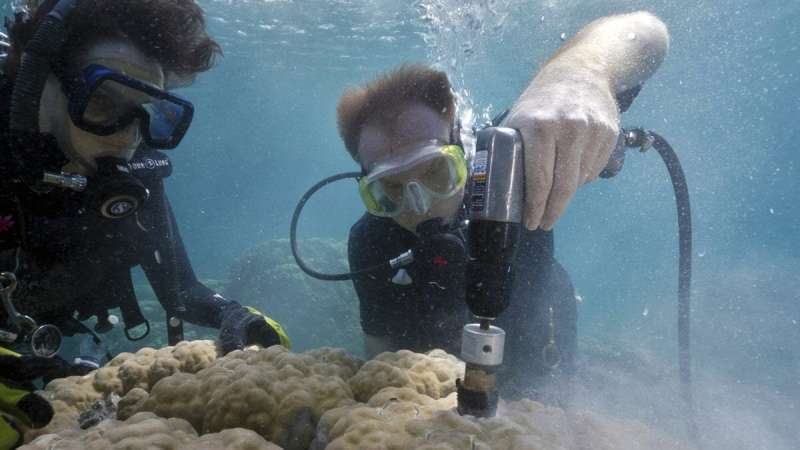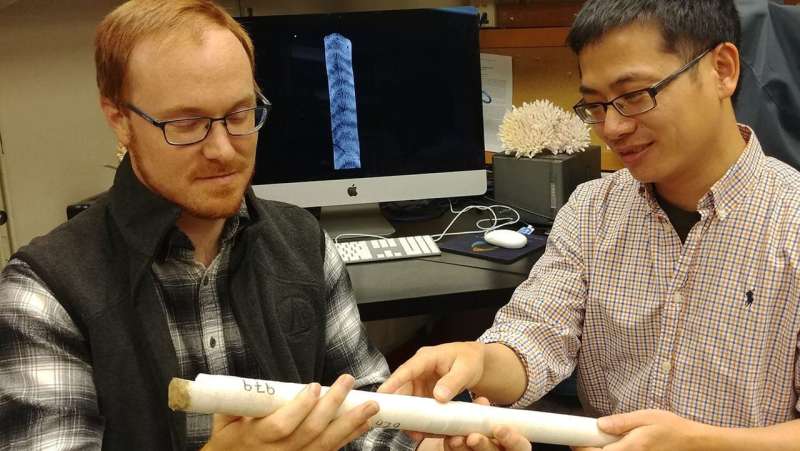Ocean acidification causing coral 'osteoporosis' on iconic reefs

Scientists have long suspected that ocean acidification is affecting corals' ability to build their skeletons, but it has been challenging to isolate its effect from that of simultaneous warming ocean temperatures, which also influence coral growth. New research from the Woods Hole Oceanographic Institution (WHOI) reveals the distinct impact that ocean acidification is having on coral growth on some of the world's iconic reefs.
In a paper published Aug. 27, 2020, in the journal Geophysical Research Letters, researchers show a significant reduction in the density of coral skeleton along much of the Great Barrier Reef—the world's largest coral reef system—and also on two reefs in the South China Sea, which they attribute largely to the increasing acidity of the waters surrounding these reefs since 1950.
"This is the first unambiguous detection and attribution of ocean acidification's impact on coral growth," says lead author and WHOI scientist Weifu Guo. "Our study presents strong evidence that 20th century ocean acidification, exacerbated by reef biogeochemical processes, had measurable effects on the growth of a keystone reef-building coral species across the Great Barrier Reef and in the South China Sea. These effects will likely accelerate as ocean acidification progresses over the next several decades."
Roughly a third of global carbon dioxide emissions are absorbed by the ocean, causing an average 0.1 unit decline in seawater pH since the pre-industrial era. This phenomenon, known as ocean acidification, has led to a 20 percent decrease in the concentration of carbonate ions in seawater. Animals that rely on calcium carbonate to create their skeletons, such as corals, are at risk as ocean pH continues to decline. Ocean acidification targets the density of the skeleton, silently whittling away at the coral's strength, much like osteoporosis weakens bones in humans.

"The corals aren't able to tell us what they're feeling, but we can see it in their skeletons," said Anne Cohen, a WHOI scientist and co-author of the study. "The problem is that corals really need the strength they get from their density, because that's what keeps reefs from breaking apart. The compounding effects of temperature, local stressors, and now ocean acidification will be devastating for many reefs."
In their investigation, Guo and his co-authors examined published data collected from the skeletons of Porites corals—a long-living, dome-shaped species found across the Indo-Pacific— combined with new three-dimensional CT scan images of Porites from reefs in the central Pacific Ocean. Using these skeletal archives, which date back to 1871, 1901, and 1978, respectively, the researchers established the corals' annual growth and density. They plugged this information, as well as historical temperature and seawater chemistry data from each reef, into a model to predict the corals' response to constant and changing environmental conditions.
The authors found that ocean acidification caused a significant decline in Porites skeletal density in the Great Barrier Reef (13 percent) and the South China Sea (7 percent), starting around 1950. Conversely, they found no impact of ocean acidification on the same types of corals in the Phoenix Islands and central Pacific, where the protected reefs are not as impacted by pollution, overfishing, runoff from land.
While carbon dioxide emissions are the largest driver of ocean acidification on a global scale, the authors point out that sewage and runoff from land can exacerbate the effect, causing even further reductions of seawater pH on nearby reefs. The authors attribute the declining skeletal density of corals on the Great Barrier Reef and South China Sea to the combined effects of ocean acidification and runoff. Conversely, reefs in marine protected areas of the central Pacific have so far been shielded from these impacts.
"This method really opens a new way to determine the impact of ocean acidification on reefs around the world," said Guo. "Then we can focus on the reef systems where we can potentially mitigate the local impacts and protect the reef."
More information: Ocean Acidification has Impacted Coral Growth on the Great Barrier Reef. Geophysical Research Letters, doi.org/10.1029/2019GL086761
Journal information: Geophysical Research Letters
Provided by Woods Hole Oceanographic Institution





















